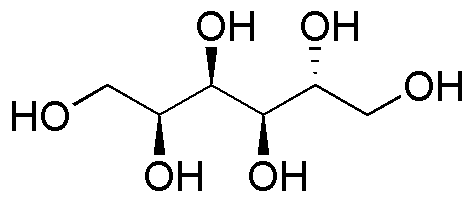D-Sorbitol is widely utilized in research focused on:
- Food Industry: As a sugar substitute, it provides sweetness without the calories, making it ideal for low-calorie and sugar-free products.
- Pharmaceuticals: Used as a humectant in creams and ointments, it helps retain moisture, enhancing the stability and effectiveness of topical medications.
- Cosmetics: Its moisturizing properties make it a popular ingredient in lotions and skincare products, improving skin hydration and texture.
- Biotechnology: Serves as a carbon source in microbial fermentation processes, aiding in the production of various bioproducts.
- Industrial Applications: Acts as a plasticizer in the manufacturing of plastics, improving flexibility and durability compared to traditional plasticizers.
Informations générales
Propriétés
Sécurité et réglementation
Applications
D-Sorbitol is widely utilized in research focused on:
- Food Industry: As a sugar substitute, it provides sweetness without the calories, making it ideal for low-calorie and sugar-free products.
- Pharmaceuticals: Used as a humectant in creams and ointments, it helps retain moisture, enhancing the stability and effectiveness of topical medications.
- Cosmetics: Its moisturizing properties make it a popular ingredient in lotions and skincare products, improving skin hydration and texture.
- Biotechnology: Serves as a carbon source in microbial fermentation processes, aiding in the production of various bioproducts.
- Industrial Applications: Acts as a plasticizer in the manufacturing of plastics, improving flexibility and durability compared to traditional plasticizers.
Documents
Fiches de données de sécurité (FDS)
La FDS fournit des informations de sécurité complètes sur la manipulation, le stockage et l’élimination du produit.
Spécifications du produit (PS)
Le PS fournit une description complète des propriétés du produit, notamment sa composition chimique, son état physique, sa pureté et les exigences de stockage. Il détaille également les plages de qualité acceptables et les applications prévues du produit.
Certificats d'analyse (COA)
Recherchez des certificats d'analyse (COA) en saisissant le numéro de lot du produit. Les numéros de lot et de lot se trouvent sur l'étiquette d'un produit, après les mots « Lot » ou « Lot de fabrication ».
Numéro de catalogue
Numéro de lot/série
Certificats d'origine (COO)
Ce certificat d'exploitation confirme le pays dans lequel le produit a été fabriqué, et détaille également les matériaux et composants utilisés et s'il est issu de sources naturelles, synthétiques ou autres sources spécifiques. Ce certificat peut être requis pour les douanes, le commerce et la conformité réglementaire.
Numéro de catalogue
Numéro de lot/série
Fiches de données de sécurité (FDS)
La FDS fournit des informations de sécurité complètes sur la manipulation, le stockage et l’élimination du produit.
DownloadSpécifications du produit (PS)
Le PS fournit une description complète des propriétés du produit, notamment sa composition chimique, son état physique, sa pureté et les exigences de stockage. Il détaille également les plages de qualité acceptables et les applications prévues du produit.
DownloadCertificats d'analyse (COA)
Recherchez des certificats d'analyse (COA) en saisissant le numéro de lot du produit. Les numéros de lot et de lot se trouvent sur l'étiquette d'un produit, après les mots « Lot » ou « Lot de fabrication ».
Numéro de catalogue
Numéro de lot/série
Certificats d'origine (COO)
Ce certificat d'exploitation confirme le pays dans lequel le produit a été fabriqué, et détaille également les matériaux et composants utilisés et s'il est issu de sources naturelles, synthétiques ou autres sources spécifiques. Ce certificat peut être requis pour les douanes, le commerce et la conformité réglementaire.

